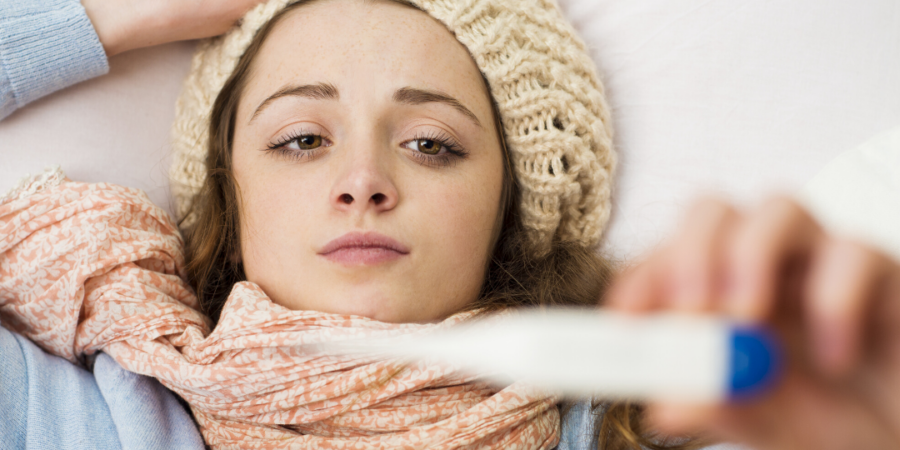



Have you tested positive for coronavirus? Read the recommendations for patients in home isolation
18 March 2020
22.03.2020
The purpose of home isolation is to isolate a patient who, after examination by a doctor, does not require hospitalization due to their health condition. Home isolation is used in patients who have a positive test result for the SARS-CoV-2 coronavirus and do not have symptoms of the disease or show mild, moderate symptoms of COVID-19 disease (e.g. subfebrile condition, cough, sore throat, weakness).
Household contacts of a sick person have the highest risk of infection. Infection occurs through droplets from speaking, coughing or sneezing, or by touching contaminated objects.
In the event of a deterioration in health, an ambulance should be called immediately, informing about the diagnosis of COVID-19 and isolation at home for transport to hospital. Deterioration may be indicated by persistent fever above 39 degrees, shortness of breath, chest pain, nosebleeds, petechiae on the skin.
THE FOLLOWING RECOMMENDATIONS APPLY DURING HOME ISOLATION:
- Measure your body temperature twice a day, drink at least 1.5 liters of fluids a day, eat 3-4 easily digestible meals.
- Stay (24 hours a day) in one room where no other household members live/stay.
- Try to communicate with your surroundings via telephone or computer, exposing other people to contact as little as possible.
- Other household members NO They should come closer than 2 meters to you.
- NO you should have contact with pets – they can transmit the virus to healthy people on their fur that you touch.
- If another person enters the room you are in, they should wear a mask over their mouth and nose (surgical or homemade fabric mask or towel).
- NO remove things from the room you are using.
- NO enter other rooms, especially if someone is there.
- If there is a shared toilet/bathroom in the apartment, use it separately, preferably as the last household member, wash the devices you use after yourself, disinfect the toilet with household products, wash your hands thoroughly before leaving. Use only your own towels, hang them in a different place than the towels of other household members. Keep toiletries, e.g. a toothbrush, in the room where you are isolating.
- Open the window often, air the room. If you have to leave the room, e.g. to go to the bathroom, put on a mask over your mouth and nose (surgical or homemade cloth mask or a towel).
- NO use fans, air conditioning, or air purifiers.
- Change bed linen and pajamas every 2 days, and towels daily. 03/22/2020
- Place used bedding, towels, and dirty clothes in a plastic bag in the room, and when it is full, hang it outside the door so someone else can do the laundry.
- Throw your trash in a plastic bag (ask for an empty bag to be hung on the doorknob) and when it is full, hang it outside the door so someone else can throw it in the trash.
- Use separate cutlery, plates, cups, glasses. They should be separate just for you.
- Consume prepared meals, water, and medications in isolation, and ask for them to be delivered to your door.
- Put dirty dishes outside the room door so that someone else can wash them in a dishwasher at a minimum temperature of 60⁰C using detergent or by hand using dishwashing liquid and hot water. After washing dishes, the person washing them must wash their hands with soap and water.
HOW TO CLEAN IN AN APARTMENT WHERE ONE (TWO SICK) PERSON IS ISOLATED AND THE REST ARE HEALTHY?
Disinfect several times a day by wiping with wipes soaked in disinfectant:
- door handles, table tops, fridge handles, cupboards, kettle handles, bathroom fittings, toilets and toilet handles, telephones, keyboards, TV remote controls, tablets, bedside tables, light switches,
- perform disinfection with rubber gloves, DO NOT wipe excess disinfectant from surfaces.
Washing clothes, bedding:
- wash clothes in a separate load, without the clothes of other household members,
- pour clothes into the washing machine directly from the bag without touching them,
- Wash clothes and bedding at the highest temperature allowed for washed fabrics, but not lower than 60 degrees C, using detergent, for at least 40 minutes.
- use clothes that can be washed at 60⁰C,
- After loading the washing machine, wash or disinfect your hands. DO NOT send items to dry cleaners.
Throwing out garbage:
- the person taking out the garbage from your house/apartment takes the bag from the door of the room in rubber gloves, puts them in a second bag, throws them in the trash. After taking off the gloves, throws them away, washes or disinfects hands.
ALL HOUSEHOLD MEMBERS ARE SUBJECT TO QUARANTINE FOR THE ENTIRE ISOLATION PERIOD AND FOR 14 DAYS FROM THE DAY THE INFECTED PERSON WAS DECLARED HEALTHY. THESE PERSONS:
- NO They can leave the house and do shopping.
- They move around in rooms where the patient is not isolated or in their own home garden without contact with the patient or neighbours.
- You should ask for help by phone/email (family, friends, or MOPS), the person delivering the necessary products should leave them at the door of your house/apartment and notify in an established manner so as not to contact you directly.
Who we are
In our work, we are guided by the idea of a family doctor who provides the patient with comprehensive care at all times, not only when they are ill. Our mission is to take care of the health of residents on a daily basis. We provide health education and promote prevention.
Copyright © Wrocław 2021 NZOZ Your Doctor Sp. z o. o. All Rights Reserved.
Website created by KomuKoncept: www.komukoncept.pl






